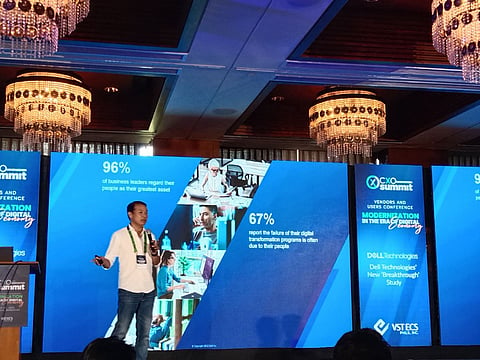
- NEWS
- the EDIT
- COMMENTARY
- BUSINESS
- LIFE
- SHOW
- ACTION
- GLOBAL GOALS
- SNAPS
- DYARYO TIRADA
- MORE

The world ever pivoting to technology does not preclude the idea of people's role in everything tech makes possible.
During his talk at the CXO Innovation Summit 2022 in Shangri-la Boracay in Aklan, conceptualized by VST ECS Philippines Inc., Dell Technologies country general manager Ronnie Latinazo said technology does not drive change on its own; people still make it happen.
"We do understand that every business organization appreciates that there is a need to transform and modernize to keep at pace to the changing environment. And our company believes that true and sustainable innovation happens when people intersect with technology," he said.
He said this is why Dell Technologies initiated a study dubbed "Breakthrough," taking the insights from 10,500 IT company respondents from 40 plus locations in the world, including the Philippines, to show that human barriers to digital transformation are creating significant friction, and fatigue.
For the Philippines alone, he revealed that 96 percent of Filipino IT business leaders regard their people as their most important asset.
But the effects of Covid 19 restrictions have made businesses struggle, as the study showed that most people working in the various businesses got tired and burnout hampering technological growth.
"The study said 73 percent of the workforce have the motivation/energy to act on digital transformation in the workplace, while 50 percent are saying they were burnout, as most staff believe they are wrestling with burnout and /or poor mental health that's impacting project deliveries," he said.
Even though most company owners surveyed consider their workforce as their asset, Latinazo said that there is also some kind of paradox, as 67 percent of enterprise owners say their people are also the cause of their failure in their digital transformation.
Also, the study revealed that most respondents said that they feel that there's a lack of digital skills and aptitude for innovation; lack of vision and people first strategy, and the lack of innovative culture.
In terms of worldwide scope, the study said over half of our respondents say they don't always have the motivation or energy to act on digital transformation in the workplace, as 41 percent of executives say their employees are struggling with burnout or poor mental health that's affecting their ability to do their work well.
Also, 64 percent of global respondents report the failure of their digital transformation programs is often due to their people.
"This extensive and seminal piece of research underscores the importance of preparing people for change, while shedding light on the complexity of driving through transformation. By understanding human behaviors and learning preferences, and taking appropriate action, businesses can turn employees from a source of friction into a source of fuel–essentially partners in driving change," the conclusion of the study read.
"As a starting point, businesses would do well to remember that people are, and will remain, their greatest source of creativity. With a thoughtful human-machine partnership, they can ignite their workforce and release the innovator in each of them," the study further said.
